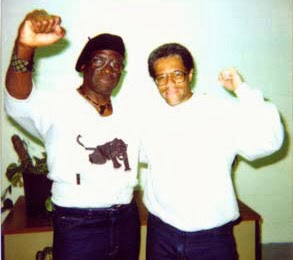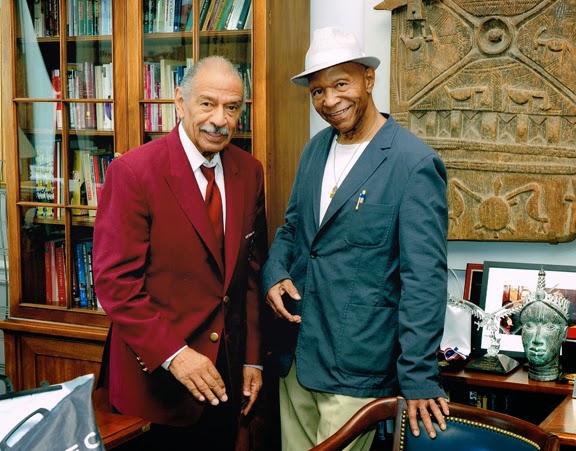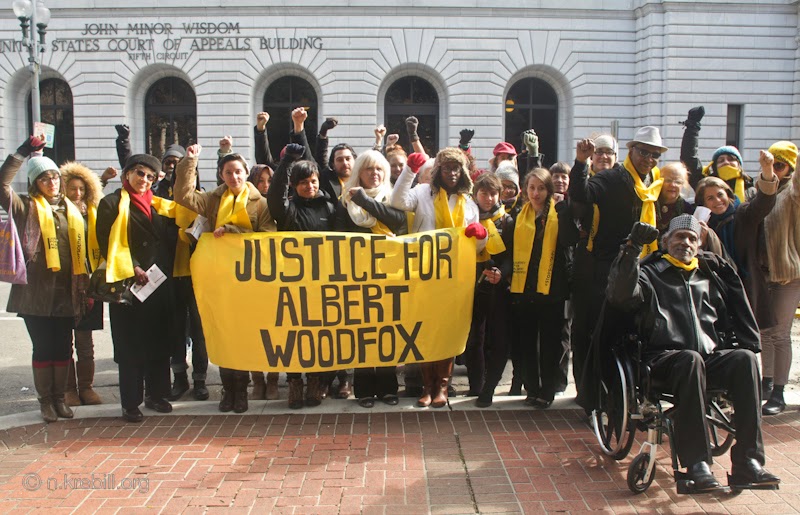 |
| (PHOTO: On behalf of the National Religious Campaign Against Torture, Rev. Dr. Patricia Bates speaks in support of Albert Woodfox at the Louisiana State Capitol in Baton Rouge on October 21, 2013.) |
A Moral Outrage: Albert Woodfox’s 41 Years in Solitary Confinement, Despite Three Overturned Convictions
–An interview with Rev. Dr. Patricia Teel Bates
By Angola 3 News
This past Fall, Herman Wallace of the Angola 3 made news headlines around the world when his conviction was overturned and he was dramatically released from prison after 41 years in solitary confinement. At the time of his release on October 1, 2013 he had been fighting terminal liver cancer for several months. Three days later, on Oct. 4, Herman was surrounded by loved ones as he passed on at a friend’s house in New Orleans, Louisiana.
As reported by Democracy Now, one of the final things that Herman said was, “I am free. I am free.” Twelve years previously in 2001, after 29 years in solitary confinement, Robert H. King was the first of the Angola 3 to be released. Today, Albert Woodfox remains the sole Angola 3 member still in prison. Currently housed in solitary confinement and forced to endure routine body cavity searches at David Wade Correctional Center in Homer, LA, Albert’s conviction has now been overturned three times.
On Oct. 15, Amnesty International declared: “Herman died a free man. Let’s help Albert live as one.” Amnesty’s call to action quoted a message from Herman released during his final few weeks: “I want the world to know that I am an innocent man and that Albert Woodfox is innocent as well…The state may have stolen my life, but my spirit will continue to struggle along with Albert and the many comrades that have joined us along the way here in the belly of the beast.”
 |
| (PHOTO: Herman on left, with Albert on right) |
For several years, Amnesty International had already been calling for both Albert and Herman’s release from solitary confinement, culminating with the hand-delivery of a 67,000 signature petition at the State Capitol in Baton Rouge, LA on April 17, 2012 (watch video). When Albert’s conviction was overturned for a third time on February 26, 2013, Amnesty began an online campaign directed towards Louisiana Attorney General James Caldwell, urging him to not appeal the overturned conviction. Not suprisingly, AG Caldwell appealed the overturned conviction. Somewhat unexpectedly, AG Caldwell also sent an email to each person that had signed onto Amnesty’s campaign audaciously claiming that both Albert and Herman “have never been in solitary confinement,” prompting responses from Amnesty International, Robert King, and MSNBC’s Melissa Harris-Perry.
In their statement, Amnesty also cited “significant flaws in the legal processes that have kept both Albert Woodfox and Herman Wallace behind bars. These flaws include inadequate legal counsel, prosecutorial misconduct, lack of physical evidence, potentially exculpatory evidence lost by the State, evidence that the key eyewitness testimony was paid for in bribes by the State, other eyewitnesses’ retracting their testimony, and now racial discrimination. To appeal this latest ruling would compound injustice and delay the legal process by years, as the U.S. Fifth Circuit Court of Appeals would have to rule before justice could be served.”
Public pressure supporting Albert and Herman intensified on June 24 when we received the sad news about Herman’s being diagnosed with terminal liver cancer. Amnesty responded by urging supporters to send personal letters to Herman, and by calling for his release from prison on humanitarian grounds.
 |
| (PHOTO: Robert H. King met with US Congressman John Conyers in May, 2013.) |
On July 12, a letter citing the Angola 3 case was sent to the Department of Justice by Congressmen John Conyers, Jerrold Nadler, Robert C. “Bobby” Scott, and Cedric Richmond, calling for an investigation of the Louisiana prison system. That same day, just hours after the letter’s release, LA’s Hunt prison reduced Herman Wallace’s classification from maximum to medium security and transferred him out of solitary confinement into the more humane conditions of a 10-bunk dorm inside the prison hospital, where he had access to a day room, and did not have to wear leg irons. Because of the transfer, Herman’s quality of life was improved during his last few months.
On Oct. 7, just three days after Herman died, The United Nations Special Rapporteur on Torture, Juan E. Méndez, called for Albert Woodfox’s immediate release from solitary, declaring that “four decades in solitary confinement can only be described as torture.” A week later, on Oct. 15, Amnesty International escalated their campaign supporting Albert by now calling for his immediate release from prison altogether. On Oct. 21, the petition first started by Amnesty in February, 2013 was hand-delivered with over 50,000 signatures urging the Attorney General to drop the appeal of Albert’s overturned conviction. This petition remains active today for those who have not yet joined Amnesty’s call to action.
At an unrelated hearing on Nov. 13, Albert testified before the same U.S. District Judge, James Brady, who has twice overturned Albert’s conviction. As Lauren McGaughy reported for the Times-Picayune, this hearing was for Albert “to argue against what he says are daily strip and cavity searches he undergoes at the hands of prison guards. Woodfox and his legal team say the searches are in violation of a 1978 consent decree issued by then-U.S. District Court Judge Daniel W. LeBlanc that ruled these searches violated the rights of inmates and must be curtailed and, in many cases, ceased.”
An editorial written for the Times-Picayune by Jasmine Heiss of Amnesty International, remarked that “in a strange twist of irony, it was Mr. Woodfox’s previous lawsuit against the state that set this precedent.” Heiss wrote further that the 1978 precedent resulting from Albert’s lawsuit, “which lasted more than 30 years, came to an abrupt end when Judge LeBlanc died in March, and the strip and cavity searches quickly resumed both for Mr. Woodfox and others housed on his tier at David Wade Correctional Center. Mr. Woodfox endures strip searches as often as six times a day. He and his attorneys tried to resolve this without litigation for months to no avail. Now they have turned to the court to step in.” Judge Brady’s ruling on this matter is still pending, while Albert remains in solitary and the routine strip searches continue.
 |
| (PHOTO: A3 supporters at the Court on Jan. 7) |
It was against this backdrop that Amnesty once again called for Albert’s release when on January 7, oral arguments were held before the 5th Circuit Court regarding Albert’s third overturned conviction. At the press conference held outside the court building, speaking on behalf of the National Religious Campaign Against Torture (NRCAT) was Rev. Dr. Patricia Teel Bates, a professor emeritus of English who taught at Louisiana State University in Shreveport for 32 years. Additionally, she is an ordained United Methodist minister serving in Homer, Louisiana through Seeds of Light, a nonprofit prison ministry she founded.
Standing outside the Fifth Circuit Court building, Rev. Dr. Bates declared:
“As a faith leader, I am here to share the religious community’s strong support for the immediate release of Mr. Albert Woodfox, and to call for an end to the immorality and inhumanity of his confinement…Last year, we witnessed the inhumane treatment of Mr. Herman Wallace, released just days before his passing after over forty-years in solitary confinement. The experience of Mr. Wallace, and Mr. King with whom I stand today, tells a devastating tale of the immorality and indignity of our justice system. Even as I speak, we remember that over 80,000 men, women and youth in U.S. prisons, jails and detention centers are subjected to solitary confinement on any given day, detained in a cell alone for 23 hours a day for months, years, decades. Such conditions have long been considered a form of torture. People of faith recognize that solitary confinement denies the essential God-given need for community and destroys not only the individuals subjected to such conditions but also our families, communities and the loved ones of those subjected to such inhumane treatment.”
In this interview with Rev. Dr. Bates, she discusses the Jan. 7 hearing as well as a recent order banning her from David Wade Correction Center, where Albert is housed, in her hometown of Homer, LA.
 |
| (PHOTO: Artwork displayed at Herman’s memorial service, w/ Herman calling for Albert’s release. See more photos of the service by Ann Harkness.) |
Angola 3 News: Could you please tell us about your work over the years inside prisons and around criminal justice issues?
Patricia Bates: Over the last forty-two years I have volunteered off and on in prisons and jails, mainly in NW Louisiana in various capacities as a literacy and GED tutor and also as a worship leader, supporter of inmate organizations, and Kairos (Outside and Inside) retreat leader and supporter.
About ten years ago, after moving to Homer, near David Wade Correctional Center, I created a nonprofit interfaith restorative justice ministry that has helped to fund Victim-Offender Dialogues thru the Louisiana Department of Corrections. Our nonprofit, Seeds of Light, provides (1) support of various kinds to offenders’ families, (2) ministers in reentry prison/jail programs, and (3) a variety of services to children and families living in at-risk neighborhoods. We operate a food bank and thrift store and hold regular worship services for those affected by incarceration. In 2009 Seeds of Light was recognized with a Governor’s award for excellence for humanitarian service to the community.
Additionally, as an ordained deacon in The United Methodist Church and the Peace with Justice Coordinator for Louisiana’s United Methodists, I advocate at the national level on a variety of restorative justice issues including opposition to the Death Penalty through People of Faith Against the Death Penalty (PFADP) and opposition to extended solitary confinement through the National Religious Campaign Against Torture (NRCAT).
A3N: When did you first begin speaking out about Albert Woodfox’s case?
PB: NRCAT asked that I advocate on behalf of Mr. Albert Woodfox and asked me to serve as NRCAT spokesperson on his behalf at the October 21, 2013, Baton Rouge press conference and at the January 7, 2014, press conference in New Orleans following the Fifth Circuit Court of Appeals hearing.
In both cases I spoke as a matter of conscience based on biblical social justice principles. Jesus said that what we do to the least of these, the poor, the hungry, the imprisoned, etc. we do to Him. I am a passionate believer in the sacred worth of every human being. As a person of faith. I must do all within my power to see that our justice system operates out of the principles of restorative justice rather than retributive justice.
Extended use of solitary confinement makes healthy restoration a near impossibility. For that reason, I am convinced that extended use of solitary confinement constitutes cruel and unusual punishment. In short, it constitutes torture.
A3N: When were you first notified that you were not allowed to return to David Wade Correctional Center?
PB: Shortly after the Oct. 21, 2013 press conference I received a phone call from David Wade Correctional Center that I could not continue to serve as a volunteer there.
A3N: Were you given a reason for the dismissal?
PB: I was given minimal explanation but can only assume, given the time line, that my advocacy somehow violated prison guidelines for volunteers.
A3N: How will this dismissal from David Wade affect your prison ministry going forward?
PB: As a matter of conscience I must speak up when I perceive an injustice such as Mr. Woodfox’s confinement to solitary for over forty years. Animal rights advocates would be outraged if animals received such treatment. How can we turn a blind eye and refuse to speak out when children of God are treated so inhumanely?
My dismissal from Wade cannot short-circuit my faith commitment to continue to work for justice. It simply means I am to work on the outside rather than on the inside.
A3N: This week, on January 7, you attended Albert’s oral arguments before the US Fifth Circuit Court of Appeals. Do you have any reflections on what transpired there?
PB: As I sat in the Fifth Circuit Court of Appeals and listened to arguments from both sides, I listened very closely with the assumption that both sides were represented by people of good will who simply had different views regarding the issue of whether or not objective race-neutral criteria had been used in the grand jury selection process in West Feliciana Parish in the case of Mr. Woodfox.
When the issue of literacy was raised, I became especially interested as I have a Ph.D. in English and taught college-level English, in addition to prison literacy, for over thirty years of my professional career before becoming an ordained minister. I am keenly aware of the unjust bias that is attached to how minorities use the English language and the unfair disadvantage this can create in minority communities.
Also, I am keenly aware that voter registration pools are sometimes inadequate to provide a race-neutral grand jury of one’s peers.
These observations, along with my faith commitment, compel me to continue to actively support Mr. Woodfox’s appeal for equal justice under the law.
His conviction has been overturned three times. Why do authorities persist in keeping him in lock down? Only they can say.
–Angola 3 News is a project of the International Coalition to Free the Angola 3. Our website is www.angola3news.com where we provide the latest news about the Angola 3. We are also creating our own media projects, which spotlight the issues central to the story of the Angola 3, like racism, repression, prisons, human rights, solitary confinement as torture, and more.











